

Andrew Taylor
Various Functions of Internal Audit in Financial sector. CyberSecurity Assessment Frameworks for Financial Audit. Compliance Monthly March 2021. Why Cyber Security Audit in Banks an Option None Can Afford to Ignore? What Internal Audit Can Do to Improve Financial Management. Internal audit refers to the audit which is performed in order to determine and evaluate the risk management effectiveness in the company, improve internal audit finance procedures followed in the company and ensure that the organization is complying with all legal requirements, regulations and laws, etc.
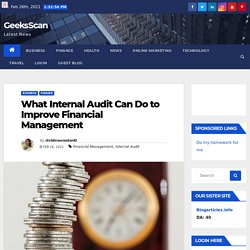
Why Internal Audit is Important for Financial Assessment? Internal Audit is a process of checking and observing regularly the deviation from any material compliance instructed regulations and norms. It also helps to maintain accuracy and timely financial reporting and data collection. It can be taken as an evaluation done by an internal auditor who could be an employee of the organization or not. Accume Partners Compliance Monthly Newsletter- February 2021. Who Is an IT Auditor and Why Do You Need One? How to Optimize the Internal Audit Process. How to Optimize the Internal Audit Process A successful audit is a very subjective term and there are various parameters that can help determine the verdict.
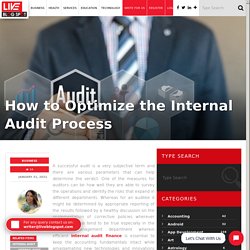
One of the measures for auditors can be how well they are able to survey the operations and identify the risks that expand in different departments. Whereas for an auditee it might be determined by appropriate reporting of the results followed by a healthy discussion on the implementation of corrective policies wherever need be. These tend to be true especially in the financial management department wherein efficient internal audit finance is essential to keep the accounting fundamentals intact while amalgamating new technologies and innovations into the operations as well. Internal Audit Focused Areas in the Financial Industry. Incorporate Understanding of CyberSecurity & Finance Auditing Environment in Businesses. Cyber Security risk is a business threat that is becoming increasingly common and can pose immense challenges to entities in the current business environment.
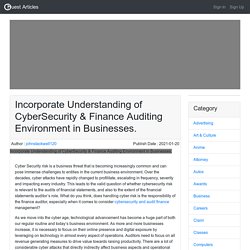
Over the decades, cyber attacks have rapidly changed to profilitate, escalating in frequency, severity and impacting every industry. This leads to the valid question of whether cybersecurity risk is relevant to the audits of financial statements, and also to the extent of the financial statements auditor’s role. What do you think, does handling cyber risk is the responsibility of the finance auditor, especially when it comes to consider cybersecurity and audit finance management? As we move into the cyber age, technological advancement has become a huge part of both our regular routine and today’s business environment. As more and more businesses increase, it is necessary to focus on their online presence and digital exposure by leveraging on technology in almost every aspect of operations. Compliance Monthly January 2021.
AccumeView January 2021. 4 Emerging Cyber-Threats to Look Out In 2021 - Newsbrut. No matter what we do in this era of the digital world, we are always directly or indirectly connected with the internet.

Whether we consider IT business, banks or any other organization, cyberthreat is one of the biggest threats that they are facing today. Apart from this, experts anticipated that the rate of cyber threat will be increased due to this pandemic. Organizations are still coping up with lockdowns and social distancing requirements and in this scenario dealing with cyberthreat is another challenge for them. A Thorough Step By Step Guide To A Successful Internal Audit. Auditing is exceptionally essential for any company, be it big or small.

Internal and external audits are designed such that they allow us to pursue as well as achieve various corporate needs. The operations and workflow of the business processes require a mixture of different forms of internal control which ease out the supervision and monitoring, identify and stop irregular transitions, analyze ongoing performances, maintain satisfactory performances, and enhance productivity. An internal audit can be performed through the utilization of the internal resources or outsourced to a reputed third party vendor. One of the major purposes of internal audit finance is to gauge out the risk of material misstatement in the company’s financial reports and produce reliable documents, the other is to play a vital role in fraud prevention. Let us have a look at the consistent process followed by professional internal auditors for a fruitful outcome.
Top Considerable Risks To Be Assessed By Internal Auditors Before 2021. An effective and sound risk-based and internal audit plan is one of the most critical components that is required in business to determine business success as a value adding and strategic business factor.
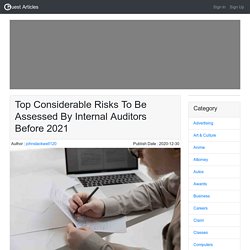
Organizations must establish a risk based plan to evaluate the priorities of internal auditing factors that determine the consistency within the company. The Future of Auditing in Business: Opportunities Brought by Technology. Every business wants reliable and effective technology to complete the business auditing process in today’s date.
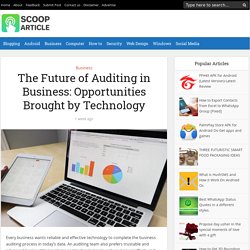
An auditing team also prefers trustable and advanced level auditing systems and technologies to reduce manual efforts and risk factors. To reduce the risk of asset loss and ensure the financial statements are reliable, accurate, and appropriate, auditors must check and analyse that the business has effective internal controls on IT audit finance. Financial management and reporting areas have been made efficiently easier in recent years due to the prevalence of technology in the internal control process.
Now the implementation of advanced technologies has become an indispensable part of a reliable audit. Compliance Monthly December 2020. Accume Partners: November 2020 AccumeView. Accume Partners Compliance Monthly Newsletter- November. IT Security Audit: Requirements, Threats & Precautions in Banks. Internal Control Functions The Internal Control Banking Functions play a crucial role in the current state of maintenance, bank’s internal control assessment, risk management factors and governance systems.

These areas in banks create a great impact on the keen interest of supervisory authorities. 5 Gains of Effective Enterprise Risk Management in the Banking Sector. Want to stand firm in this influencing world?
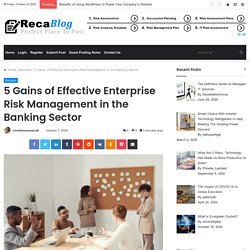
Your business must incorporate various unique methods and techniques to alleviate the risk. Enterprise risk management is one of those methods that helps your banking organization to stay away from various business risks by incorporating essential strategies. There are various risks associated with your banking business, such as credit, operational risk, market, and liquidity risk, and a lot more. Top Risk Areas of Internal Audit That Needs To Be Address in 2020. Every business has to face new challenges and opportunities every year.
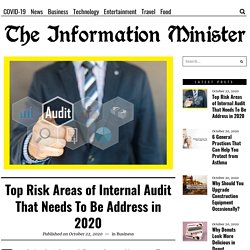
The digital advancement in this digital world brings both opportunities and challenges. To emerge as a globally recognized organization, you need to deal with challenges and snatch the opportunities. In the same way, the role of an internal auditor is also upgraded. They have to efficiently manage the upgraded organization risk and effortlessly cooperate with the situation. The current era brings digital transformation, enhancing opportunities, and uncertainties for several global organizations and banks. A Perspective on Enterprise Risk Management as a Future for Banking Sector. An efficient & successful ERM – Enterprise Risk Management can ensure that risk taken by banking sectors is compensated by a proportionate level of both risk and reward. In the banking sector, managers are integrated with high levels of risk factors with the uses of integrated models. It delivers tangible benefits in terms of cost association, compliance integration and better risk management concepts that give better pictures of the risk being faced by the bank.
The risk management process in organization becomes more robust with the specific data structure, a common technological architecture supporting the entire banking process. The Decisive Features of Internal Auditing in The Banking Sector. As the various sectors are facing new regulations & challenges, this introduced compliance regulation for organizations. Whether it be the efficiency & quality of the organization’s operational process or driving organization towards growth, internal audit plays a pivotal role in enhancing your overall organizational structure. Regulating these regulations and compliance is not a practical option for your organization; you require an effective independent internal audit for your banking organization to witness the operations work consistently.
AccumeView October 2020. Compliance Monthly October 2020. Needs of Risk and Regulatory Audit in Banking. Over The last decade, the banking world has faced unpredictable changes and challenges, resulting in a slew of compliance regulations. Banks of all sizes from non-public, commercial and private sectors are now more effectively concerned than ever about compliance risk management and regulatory audit procedure. New banking services have increased government scrutiny and intense focus on the requirements of regulatory compliance & risk management which has brought forth greater risks and a larger set of rules and regulations. Banking sector has also been forced to consider a fresh look at their compliance practices and technological infrastructure that supports them and to pursue a wide range of compliance and risk initiatives across the banking sector.
Regulators and government bodies are issuing newer and effective regulations to prevent future financial crises to crack the whip down on banking organizations that do not conform. Compliance Monthly September 2020. Scope and Effectiveness of Internal Audit in the Banking Sector. Let us begin by defining what internal audit signifies in the banking sector. It is an independent examination of the financial statements and monitoring of the bank’s system of internal controls and procedures. These audits when conducted at regular intervals helps the management in the protection of assets and evaluating all the possible risks that might cross paths with the organization.
In today’s day and age, there are ample technological advances that can be integrated and implemented by the internal auditors that make for an effective audit implementation. Why Are Cyber Security & Privacy Solutions Vital for Banks? Cyber Security & privacy solutions for banking has become a very important solution. Whether it would be profit and non-profit organizations, organizations and institutions also carry very important information, data, and documents about their customers and clients which is necessary to keep their data safe from cyber hackers and criminals.
August 2020 AccumeView- Executive Cybersecurity Pulse Newsletter. Accume Partners Compliance Monthly Newsletter- August. Role of Technology and AI in Internal Audit - TIME BUSINESS NEWS. Several firms have evolved to integrate technology into their internal audit processes for the better. Surveys suggest that some big organizations, as well as startups, are yet to assimilate the technological advances into the system operations. Cyber security and Privacy Solution for Banking - Kiasalon.
The banking sector has been under attack for hundreds of years. In the past experiences, we have seen that the mode of frauds were limited to physical theft only. Enterprise Risk Management in Banking: Understanding & Opportunities. Enterprise Risk Management (ERM) in the banking industry has implemented new regulations since 2014 which specially impacted the performance and outcomes of banks. Where the financial management objectives contain high firm values, commonly these firm’s values are created and measured by profitability ratios and share records.
Digital Risks: Now It is Time to Implement Cybersecurity and Privacy Solution. Accume Partners: Accumeview July 2020 Edition. Accume Partners: Compliance Monthly Newsletter- July. Enterprise Risk Management: Types & Strategies. Internal Audit - Nature & Business Objectives. Internal Audits are conducted for different reasons and objectives. It is helpful in optimizing multiple risk exposures of the organizations that would be needed to conduct in order to observe organizational performance. Some audits are required by proper regulations or policies, while others are requested by the management to improve organizational processes and identity internal control drawbacks. Internal Audit: Definition, Differences, Procedures & Purposes. Practical Concepts of Enterprise Risk Management Frameworks. Enterprise Risk Management has never been as topical, after the financial crisis of 2008, ever spread cybersecurity threats, market volatility, regulation increment, climate changes, and technological changes & stakeholders activism are just a few factors that need proper focus on enterprise risk management.
Step By Step Evaluation of Internal Control System - Rippl USA. AccumeView June 2020 1. Compliance Monthly June 2020. Enterprise Risk Management in COVID-19 crisis. The importance of CyberSecurity of Small Business. 3 Key Risk Factors to Consider During Internal Audit - cluebees. Compliance Monthly May 2020 REVISED v1. Compliance Monthly Mar 2020. 5 Top Benefits of IT Audit for your Company. The Differences Between Traditional and Enterprise Risk Management. Cybersecurity Advisor - Protect Your Networks, Computers & Data. 5 Characteristics you should look for before hiring a Cybersecurity Advisor - Zophra.
How can you improve the relationship between Enterprise Risk Management & Internal Audit? How To Prevent Fraud And Identify Accounting Errors Before They Become Problems - Major Business Center For economy Solutions. Challenges associated with Audits of Internal Controls. Things to keep in mind while implementing ERM program. What are ‘Internal Controls’ and Why Do They Matter? - Make a Plan: How to Save Money - Money-plans.com. Major Types Of Risk Reporting You Should Know : ONB. Should You Care About Your Internal Control System? - News & Updated Analysis on Investing. IT Audit Checklist For Regulatory Compliance - Nexxy Technologies. A Detailed Guide to Risk Reporting - Postesy. A Detailed Guide to Risk Reporting - Postesy.
Do You Understand Your Investment Risk Appetite? How to use a Risk Appetite Framework to Align Strategy and Risk - A legend in the field of Loan Advice. Compliance Monthly December 2019. Compliance Monthly December 2019. Compliance Monthly November 2019. The Agencies Jointly Issued A Final Appraisal Rule For Real Estate – Home Finance Planet. McAfee Labs Report Claims Cybercriminals Are Attacking Weak IoT Devices – Hostistry is a place to share and discuss technology.
AccumeView September 2019. Compliance Monthly September 2019. Accume Partners: Compliance Monthly Newsletter- September. Compliance Monthly July 2019. Compliance Monthly July 2019. Compliance Monthly June 2019. FDIC and FRB Issued a Joint Advisory on FCRA Amendment for Private Education Loans. University of Toronto's Study Indicates Health Care Apps Leak Your Data - FutureEnTech. Thailand Passes a Controversial Cybersecurity Law Giving Huge Power to State Cyber Agencies. AccumeView May 2019. Compliance Monthly May 2019. AccumeView May 2019. Compliance Monthly May 2019. Hackers Steal Tens of Millions of Dollars From Eastern European Banks. Compliance Monthly April 2019. Automated Cyber Attacks are Expected to Pose Threats to Businesses in Future - TechiBuddy.com. A New Hacker Group Attacks Russian Banks - Finance Blog News. OCC & FDIC Request Comments on Proposed. CISA Act : New Cyber security Agency - Accumeview. Compliance Newsletter March 2019 2. Agencies Propose to Raise the Major Assets Prohibition Thresholds to $10 Billion.
Ultimate Guide: The Fundaments Of The Functions Of The Internal Audit Team - Forbehind - Latest Information. Compliance Newsletter Feb 2019. AccumeView January 2019. The Federal Reserve Board Issues A New LFI Rating System. January 2019 Compliance Monthly. SWIFT WhitePaper. The Significance of Threat Intelligence to Your Business.